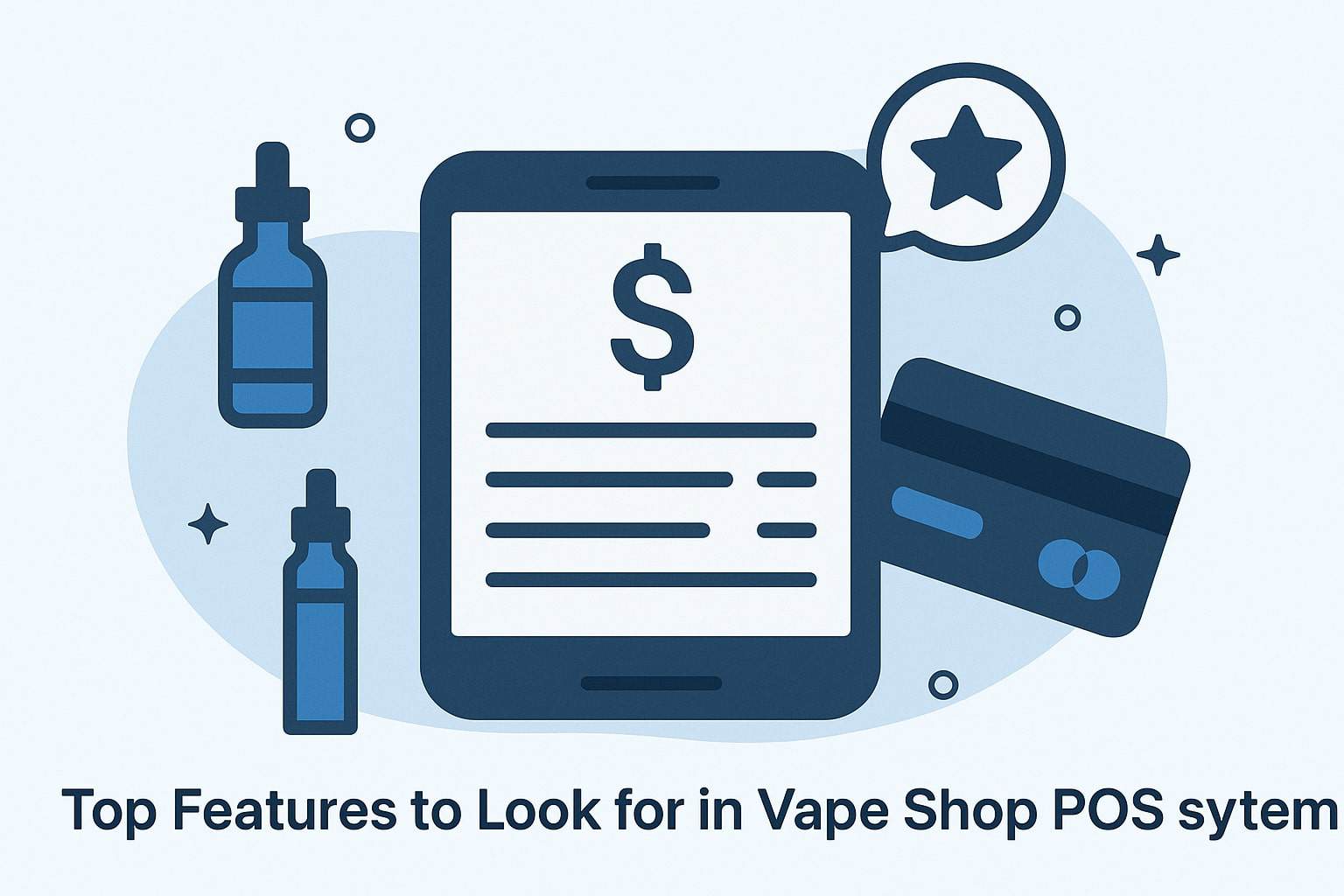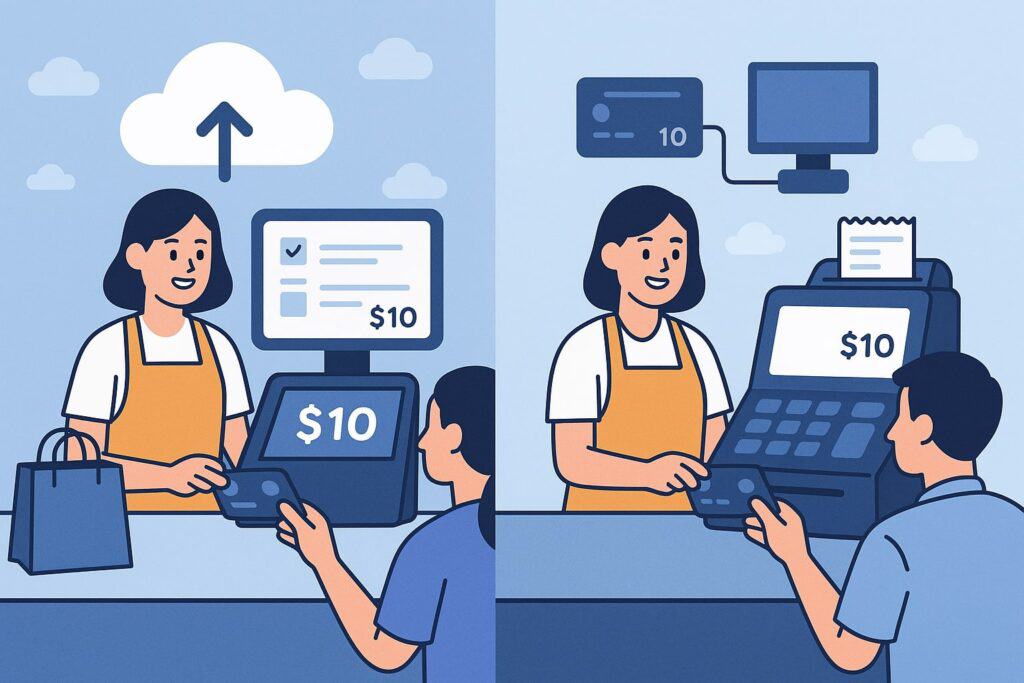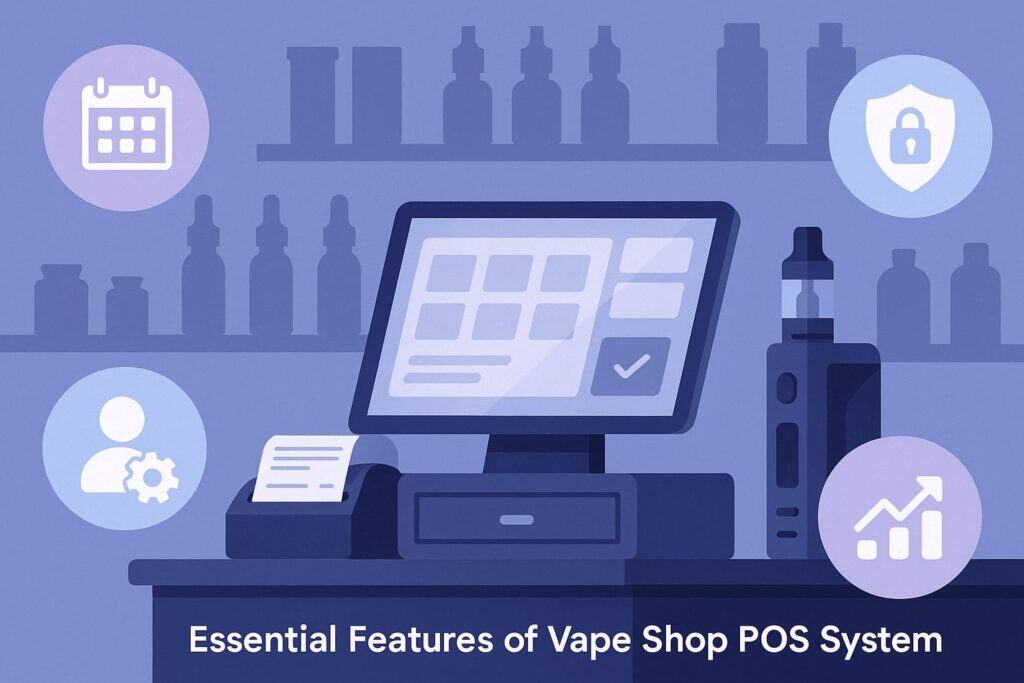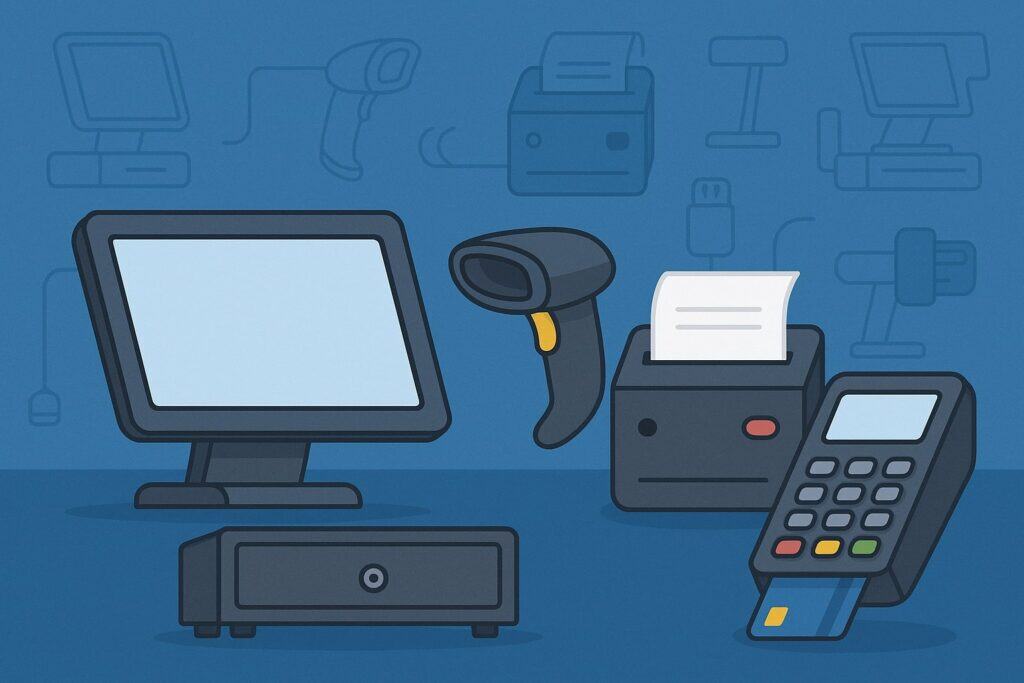
By vapeshoppointofsale September 13, 2025
Vape stores face strict age and product regulations, and compete in a rapidly growing market. A specialized POS helps track diverse inventory (flavors, nicotine levels, hardware) and ensures legal compliance (age checks, taxes). Modern vape POS tools boost efficiency and help stores stay competitive.
Vape products are among the fastest-growing retail categories. One industry report found that from 2020 to 2022 the number of vape and e-cigarette brands jumped by about 46%, with sales volumes up nearly the same amount. This means the items you sell will change quickly, so your POS must adapt to new SKUs and trends on the fly.
Retailers are opening new vape shops at a fast pace. Industry analysts estimate U.S. vape store count grows around 20% each year. This makes the market competitive. A good POS system streamlines operations (inventory management, sales, accounting), letting owners focus on customers instead of paperwork.
Compliance is critical. Vape shops must verify every buyer’s age and keep records. The FDA now requires carding anyone 30 or younger. Look for POS software that automates ID scanning and logs each age check. A built-in tax tracking and reporting tool will also save you headaches with state and federal regulations.
Vape products come in countless flavors, nicotine strengths, and hardware types (mods, coils, cartridges). A generic cash register won’t suffice. Industry-specific POS systems let you create “parent” products with many variants.
They also track expiration dates and batch codes for regulated items. With features like low-stock alerts and automated reordering, even small shops can efficiently manage hundreds of SKUs.
Cloud-Based vs Traditional POS Systems

Cloud-based POS systems host data online, letting owners access sales and inventory from anywhere. They often use subscription pricing with low upfront costs, making them popular for startups.
Cloud POS platforms automatically update and back up your data, simplifying IT management. Because data is stored off-site by the provider, you can run reports and manage your shop on a laptop, tablet, or phone wherever there’s internet.
Traditional (on-premise) POS keeps all business data on local servers or terminals in your store. Retailers typically buy the system outright and own the hardware. This means a higher initial investment, but no recurring software fees.
All sales and inventory data live on-site, so the system can operate fully without internet – ideal if your connection is unreliable. However, updates and syncing must be handled manually by staff or IT support.
| Aspect | Cloud-Based POS | Traditional POS |
|---|---|---|
| Data Storage | Hosted on remote servers | Stored on a local server in-store |
| Cost Model | SaaS subscription (monthly/annual fee) | One-time license and hardware purchase |
| Accessibility | Accessible anywhere with internet | Access limited to on-site terminals |
| Offline Capability | Limited when offline (some offer local cache) | Fully functional without internet (data on premises) |
| Updates & Maintenance | Automatic updates and backups | Manual updates and local IT support required |
| Scalability | Easily add registers or locations | Expanding requires new hardware and setup |
| Security & Risk | Provider-managed security (internet risks) | Data physically secured on-site (requires local backups) |
Many new vape shops prefer cloud POS for its flexibility and low startup cost. Traditional systems may suit operations with strong in-house IT or areas with poor internet. Consider your budget, growth plans, and network reliability when choosing.
Essential Features of a Vape Shop POS System

Inventory & Stock Control
Proper inventory management is critical in vape retail, where products come in many flavors and styles. A good POS helps you track and reorder stock efficiently.
- Inventory Management: Track dozens of vape products with detailed SKU management, flavor and nicotine variants, and low-stock alerts. Automated reorder points and vendor management help you avoid stockouts and keep shelves full.
- Barcode Scanning: Speed up checkout and prevent errors with product barcode scanning. Scanning disposables, e-liquids, coils, etc., instantly applies correct pricing and taxes. Each scan also deducts inventory from your stock counts, keeping data accurate without manual entry.
- Vendor & Supplier Integration: Automate restocking by integrating supplier catalogs. Advanced POS can generate purchase orders when stock hits reorder level. This saves time and reduces errors in ordering, ensuring popular vape products are replenished promptly.
Payments & Sales
Seamless payment and sales processes keep customers happy and lines short. The POS should support high-risk payment options and link online and in-store sales.
- Payment Processing: Vape shops are high-risk businesses, so choose a POS that handles specialized high-risk payment processing. Integrated processors sync transactions automatically and can offer better rates for vape products.
It should also accept EMV chip cards, NFC/mobile wallets, and other modern payment methods. Next-day funding and chargeback protection are extra perks to consider. - E-commerce Integration: Link your store’s online and in-person sales. The right POS can upload products to your website, sync inventories, and process web orders for delivery or pickup. This ensures customers see correct stock levels whether they shop online or walk in.
- Offline Mode: Ensure uninterrupted sales even if the internet drops. Some POS can run offline and store transactions locally until reconnected. This avoids lost sales or delays when connections fail.
- Hardware Compatibility: Make sure the POS supports necessary devices: receipt printers, barcode and ID scanners, cash drawers, and customer displays. Flexible hardware means you can equip each register the way you like.
Customer Engagement & Operations
Features like loyalty programs and employee tools help run the shop smoothly. A POS that stores customer data can power targeted marketing, while staff management features boost productivity.
- Customer Loyalty & CRM: Build loyal customers with integrated reward programs and customer tracking. Look for POS that issues loyalty points or discounts and captures purchase history. Then you can send targeted emails, promotions, or surveys based on individual buying habits.
- Marketing & Upselling: Find POS features for promotions. Some systems can send email campaigns, issue gift cards, or suggest add-on products at checkout. Automated deals and up-sell prompts can increase average ticket size and customer retention.
- Employee Management: Control staff actions and track performance. Many POS allow employee clock-in/out and limit permissions (e.g. void or discount privileges). Assigning roles reduces mistakes and fraud. Tracking sales by employee also helps with payroll and commissions.
Reporting & Analytics
Detailed reporting turns POS data into business intelligence. Look for sales and inventory reports that guide ordering and promotions, and integrations that keep your back-end systems in sync.
- Reporting & Analytics: Gain business insight from sales data. A vape POS should offer customizable reports (daily sales, inventory valuation, tax summaries).
Analytics highlight best-sellers and slow movers, letting you optimize orders (for example, stock up on popular flavors) and file taxes easily. - Multi-Store Management: For franchises or multiple locations, choose a POS with central control. It should allow stock transfers between stores, oversee inventory across all shops, and provide unified reporting. Role-based user access ensures managers see relevant data for each site.
- Integrations: Connect your POS with accounting (QuickBooks), payroll, and online tools. Good systems offer APIs or built-in apps so data flows seamlessly between platforms. This cuts down on double-entry and keeps all your business tools in sync.
Security & Compliance
Compliance and security features protect your business from fines and fraud. The system should enforce age checks and secure sensitive data through encryption and user permissions.
- Age Verification & Compliance: Ensure legal sales with POS-integrated ID scanning and age-gate software. The system prompts cashiers to scan IDs and logs each verification.
The POS should also categorize products (like CBD or delta-8 vapes) that carry different age restrictions, since non-nicotine vape products have separate regulations in many areas. - Security: Protect customer and business data. Ensure the POS is PCI-compliant and encrypts payment information.
It should also back up data offsite and require secure logins. Role-based permissions add security by preventing unauthorized voids or access. A secure POS defends your shop against theft and compliance violations.
Mobile & Peripherals
Modern POS systems often run on tablets or smartphones, expanding where sales can happen. Ensure your system supports mobile devices and all needed peripherals (scanners, printers, etc.).
- Mobile POS (Tablet/Phone Support): Look for systems that run on tablets or smartphones. Mobile POS lets staff ring up or check stock anywhere in the store, speeding service. This is ideal for busy shops or pop-up events, effectively turning any device into a register.
Additional Useful Features
Beyond core functions, consider extra tools that improve efficiency. For instance, accounting integration connects your POS to bookkeeping software (QuickBooks, etc.) to sync sales and tax data automatically. Automated purchasing can generate orders when stock runs low, saving time on reordering.
Many POS platforms now include built-in customer management or loyalty modules for targeted marketing. Some offer employee time-clock and payroll features. Look for extras like gift-card support or integration with delivery services, which can further streamline your operations.
Potential Pitfalls
Not all POS systems are equal. Avoid solutions with only generic retail features and no age-verification tools. Beware hidden fees (for example, some platforms charge extra for gift cards, loyalty, or advanced reports). Check hardware costs: some systems require expensive proprietary devices.
Choose providers experienced with vape or tobacco retailers, as they understand compliance requirements. A one-size-fits-all POS may lag on legal updates (age laws, product bans).
Finally, read user reviews and ask fellow shop owners about reliability and support; great features mean little if the system crashes often.
Cost and Pricing
A vape POS involves two main costs: software subscription and hardware. Subscriptions typically range from about $60–$150 per month depending on features.
Hardware (register terminals, barcode scanners, receipt printers) is often purchased upfront, though some providers bundle or finance it. Look for transparent pricing (monthly vs annual) and any setup fees.
POS Hardware and Accessories

Your POS hardware should match your shop’s needs. Typical setups include a touchscreen terminal or tablet for checkout, a cash drawer, a receipt printer, a barcode scanner, and a customer-facing display.
Some shops also use dedicated ID scanners for age verification. Tablets or mobile card readers can reduce costs and add flexibility for mobile checkout.
Implementation and Training
Implementing a new POS needs planning. Many vendors offer onboarding support to configure products, taxes, and hardware. Look for live demos, documentation, and training sessions.
Robust support (for example, 24/7 assistance) ensures you can get help during busy hours. Proper staff training helps your team master the system quickly and reduces mistakes.
FAQs
Q: What is the typical cost of a vape shop POS system?
Answer: Most vape POS vendors charge a monthly software fee plus hardware costs. Plans often range from $60–$150 per month depending on features. Hardware (registers, scanners, etc.) is usually a one-time expense. Some companies bundle hardware with subscriptions or offer financing deals.
Q: Does a vape shop POS integrate with accounting or marketing tools?
Answer: Yes. Leading vape POS systems integrate with accounting (e.g., QuickBooks), payroll systems, and e-commerce platforms. They can also connect to email marketing or loyalty apps. These integrations automate data sync, saving time and reducing errors.
Q: Can I expand my vape shop and add more stores later?
Answer: Many modern POS solutions support multiple locations. A multi-store POS lets you add registers or new stores easily, with centralized inventory and sales tracking. Make sure the system you pick has solid multi-location features and role-based user access from the start.
Q: Is offline mode important for a vape shop POS?
Answer: Yes. Internet issues can halt sales. Systems like Square and Lightspeed can still process transactions offline and sync later. Without it, you risk losing sales when the internet goes down.
Q: What hardware will I need for a vape shop POS?
Answer: Typical hardware includes a checkout terminal or tablet, cash drawer, receipt printer, barcode scanner, and often an ID scanner for age checks. A customer-facing display can also be useful. Ensure the POS you choose is compatible with these devices, including mobile tablets or phones for flexible checkout.
Q: Are there POS systems tailored for vape shops?
Answer: Yes. Several POS systems specialize in tobacco and vape retail, offering the features we discuss. These purpose-built platforms include age-verification, compliance updates, and detailed product variant tracking. Examples include FTx POS, Lightspeed Retail, and Clover (with high-risk processing).
Q: Can a POS enforce age-restricted product rules?
Answer: Absolutely. A vape POS can be configured to require ID scans or manager approval when selling age-restricted items. You can tag products (like e-juice or vape devices) as “tobacco” or “nicotine” and the system will prompt an age check at checkout.
Q: Does a vape POS handle promotional pricing?
Answer: Yes, modern POS systems allow flexible discounts and promotions. You can set up percentage-off deals, bundle discounts, or loyalty coupons directly in the POS. Some systems also support tiered pricing (e.g., member pricing) and register prompts for upselling related products at checkout.
Q: How do vape taxes factor in?
Answer: Vape products can have state tobacco taxes. A good POS will let you set tax rates per product or category. It calculates taxes at checkout and provides reports to simplify remitting taxes. This is part of the inventory and reporting features mentioned above.
Q: What if I need help after purchase?
Answer: Support is crucial. Look for POS providers that offer ongoing customer service, ideally 24/7. Check if they have knowledge bases or local partners. Good support ensures any glitches (network, hardware, software) get resolved quickly so your shop doesn’t suffer downtime.
Conclusion
Choosing the right POS is critical for vape shops. The ideal system handles complex inventory (flavors, nicotine levels, devices) and enforces all age-verification rules.
Core features include ID scanning, e-commerce integration, loyalty programs, and robust reporting. Cloud POS systems offer flexibility and low upfront cost, while on-site systems work even without internet.
On-site systems operate without the internet. Evaluate support, integrations, and pricing closely. A good vape POS will streamline operations, keep you compliant, and help your business grow.